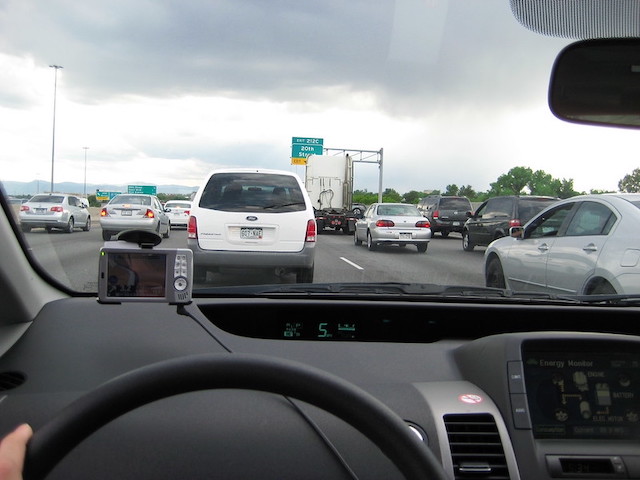The Denver/Colorado Springs Gazette has published two articles by the Antiplanner highlighting problems with transportation planning in Denver and nationwide. The first, dated September 11, argues that cities have lost the war on cars. In particular, Denver has been reducing roadway capacities and spending billions on transit, yet driving keeps growing. A follow-up editorial by the newspaper agrees.
Stuck in traffic in Denver, thanks to local and regional transportation planners. Photo by Adrian Black.
More recently, an op-ed by the Antiplanner argues that the pandemic has changed Colorado transportation for good, yet transportation planners still plan for a pre-pandemic world. The number of people working at home in the Denver urban area tripled between 2019 and 2021, which devastated transit ridership yet led to an 8 percent increase in driving as people working at home run errands and take other auto trips they weren’t taking when confined to an office.
This also led to a follow-up article critical of Denver’s failure to do anything to solve traffic congestion. The article quoted the Antiplanner observing that Denver has spent $8 billion on transit improvements since 2000, yet the percent of workers commuting by transit remained fixed at 4.8 percent between 2000 and 2019 and dropped to 1.9 percent in 2021.
Despite the failure of rail transit to get anyone out of their cars, Denver’s Regional Transit District (RTD) still wants to build an expensive rail line to Longmont that its own projections indicate few people will ride. To “study” the feasibility of this rail project, RTD hired HDR, a transportation consulting firm that has never met a rail project it didn’t like. After all, everything is feasible if the government subsidizes it enough.
Meanwhile, Denver’s regional government wants to call a halt to any highway expansions that could relieve congestion. The Denver Regional Council of Government’s latest plan calls for bus-rapid transit instead. That means turning lanes now open to automobiles into exclusive bus lanes for nearly empty buses. Supposedly this is to reduce greenhouse gases even though Denver buses produce far more greenhouse gases per passenger-mile than either cars or light trucks, and the increased congestion that will result from losing auto lanes will produce even more.
Housing is going through a similar paradox. Cities such as Denver and Seattle continue to subsidize construction of multifamily housing and discourage construction of single-family housing, yet Americans clearly prefer to live in single-family homes. In the Seattle urban area, for example, the number of households in single-family homes grew by 5 percent between 2019 and 2021 while the number living in multifamily homes dropped by 1 percent. People are moving out of cities that have made housing expensive by focusing on multifamily housing.
This is a nationwide problem as cities and transportation agencies all over the country continue to make plans that no longer make sense. Telecommuters made up 47 percent of Seattle workers in 2021, yet Seattle is spending billions on new light-rail lines. The pandemic increased Austin telecommuting by 223 percent and reduced Austin transit commuting by 62 percent, yet Austin is still planning multi-billion-dollar light-rail lines that have never worked in any other city.
Rail transit is obsolete. Urban transit is irrelevant to most urban residents. Everyone depends on motor vehicles and roads, if not to get around themselves then to rely on deliveries by various kinds of trucks. It’s time for state and local officials to catch up with how Americans really want to live.









Why transit failed in Denver, like transit agencies nationwide what subsidies did was pervert work effort and priorities. Instead of providing transportation they provided palaces ie white elephants.
Denver is a class grid city.
The solution as I’ve argued is do nothing….. traffic gets worse…. don’t whine. People ask why we’re stuck in traffic… YOU ARE THE TRAFFIC. Why movie theaters so crowded….s’good movie!
Road building has its point of diminished returns, that peal has long since been exceeded. We have thousands of structurally deficient bridges in lieu of overhaul. We’re in a recession. Our government is pissing away money on another proxy war….
I thought the September 11 editorial was quite good.
And if you’re correct, the next phase is the loss of economic viability of American cities that restrict mobility.
Lots of cities may be about to find out that their strength was derived from suburban commuters, mostly in cars.